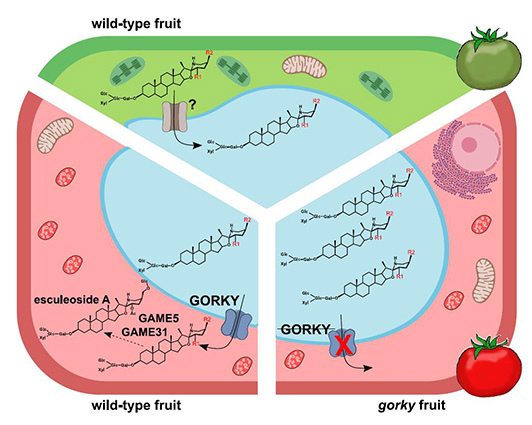The GORKY glycoalkaloid transporter is indispensable for preventing tomato bitterness
DynaMo scientists in Nature Plants paper on the domestication of wild green tomato plants involved a transport protein that now constitutes a target in tomato breeding.
Kazachkova Y, Zemach I, Panda S, Bocobza S, Vainer A, Rogachev I, Dong Y, Ben-Dor S, Veres D, Kanstrup C, Lambertz SK, Crocoll C, Hu Y, Shani E, Michaeli S, Nour-Eldin HH, Zamir D, Aharoni A.
Nature Plants, volume 7, p 468–480 (2021). Doi:10.1038/s41477-021-00865-6
During development, plants control fruit taste by balancing the content of sugars, acids and in some species, bitter tasting compounds. Once the seeds have matured, fruit ripening involves sweetening and a change in pigmentation to attract fruiteating animals (frugivores).
 Figure: GORKY is required for eliminating bitterness in tomatoes during ripening. During the green stage (wild-type fruit – green) tomatine is made and stored within the vacuole (internal cell storage compartment – blue). In a normal tomato plant (wild-type fruit – red), the GORKY transport protein exports tomatine from the vacuole so it can be converted to non-bitter form. In a mutant tomato plant lacking GORKY (gorky fruit), tomatine is not released from the internal storage and the fruit remains bitter
Figure: GORKY is required for eliminating bitterness in tomatoes during ripening. During the green stage (wild-type fruit – green) tomatine is made and stored within the vacuole (internal cell storage compartment – blue). In a normal tomato plant (wild-type fruit – red), the GORKY transport protein exports tomatine from the vacuole so it can be converted to non-bitter form. In a mutant tomato plant lacking GORKY (gorky fruit), tomatine is not released from the internal storage and the fruit remains bitter
During fruit development, tomato plants bear green colored fruits with a bitter taste due to a high content of an antifungal and antimicrobial defense compound called tomatine. When the tomato fruit ripens the fruit converts the entire pool of bitter tomatine to non‐bitter esculeosides. This ‘metabolic shift’ was likely linked to the evolution of a frugivore‐based seed dispersal, which included the development of attractive pigmentation and increased sugar content. The proteins involved in the conversion of tomatine have remained unknown till now.
We screened a collection of 650 different tomato varieties to identify nine bitter‐tasting accessions including ‘high α‐tomatine’ Peruvian landraces. Combined fine mapping and genotyping of these ‘bitter’ varieties showed that they all contain a deletion in a gene we have named GORKY (meaningbitter in Russian). GORKY is a transport protein that becomes active during fruit ripening, where it exports tomatine from the cell’s internal storage compartment (Figure 1). This facilitates the conversion of the tomatine pool to non‐bitter forms, rendering the fruit sweet to eat. Hence, GORKY activity was a significant innovation in the process of tomato fruit domestication and breeding.
- Transport proteins constitute important breeding targets for domestication of wild plant species
